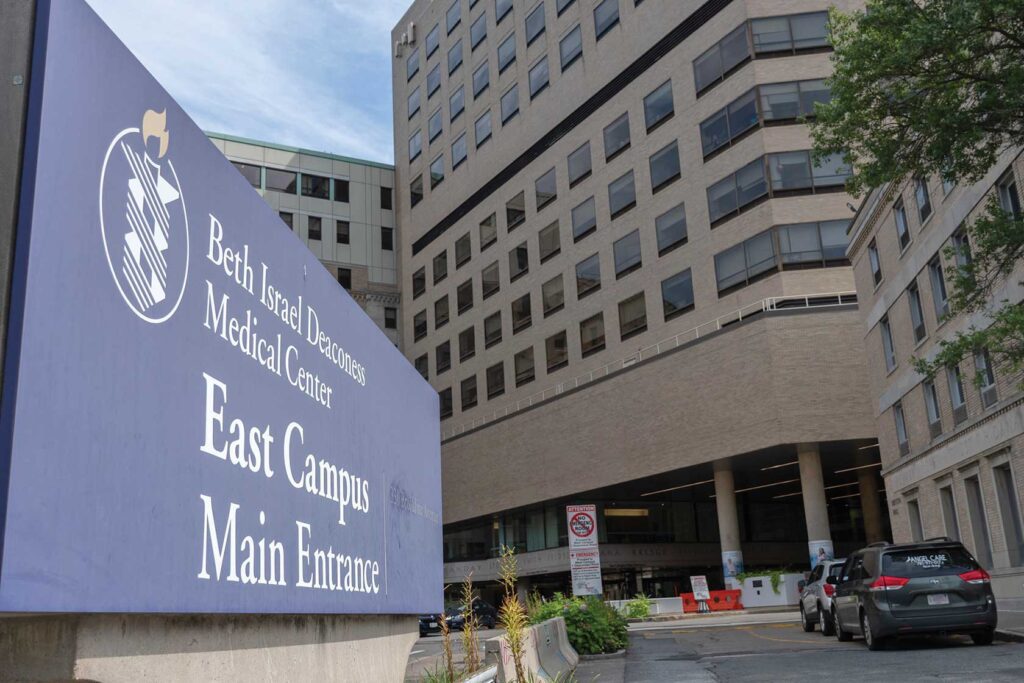
A new national study from Beth Israel Deaconess Medical Center investigating longer-term impacts of COVID-19 found that, among older patients, those who were hospitalized with COVID-19 were nearly twice as likely to die after discharge compared to patients with the flu.
The study, published August 9, also found disparities related to income and racial background. Lower-income patients were more likely to die or be readmitted to the hospital after discharge. Black patients were more likely to be readmitted following treatment for COVID-19.
Dhruv Kazi, an associate professor at Harvard Medical School and one of the study’s authors, said the research provides a clearer understanding of what patients experience after being treated for COVID-19 in a hospital.
“We knew from the early days of the pandemic that in-hospital mortality started up high and has been gradually declining, but we didn’t have a full picture of what happens to individuals once they’re discharged,” Kazi said.
Kazi said this study’s findings on low-income patients and patients of color show continued trends of more severe hospitalizations and higher in-hospital mortality.
“What we’ve shown is that this disparity continues in the post-discharge period,” he said.
Kazi said the study’s authors can only hypothesize about why that disparity exists, but even without specifics, it’s clear those patients need more attention.
“Without speculating on the mechanism, there really is a need to provide greater post-discharge support to these individuals — monitoring and support — to ensure that, to the extent that we can, we lower this burden of morbidity and mortality,” Kazi said, referring to disease and death.
Justin Kingery, a professor of medicine at the University of Louisville School of Medicine unaffiliated with the study, said its comparison between COVID-19 outcomes and flu outcomes is a strength of the research.
“It’s obviously a terrible, terrible thing that’s happened, but is that different than your typical flu virus and things like that on a patient-to-patient basis?” said Kingery, who conducted similar research on a smaller scale in New York early in the pandemic.
For their study, Kazi and his fellow researchers pulled data from Medicare claims of patients 65 or older.
Based on the study’s data source, it may be challenging to generalize its results to a broader, younger population, Kingery said.
While the study looks at the impact of COVID hospitalizations, Kazi said it isn’t looking at long COVID, where symptoms of the disease continue for an extended period of time.
“Patients don’t have to even be hospitalized to get long COVID. You can have a mild COVID infection and have persistent symptoms,” Kazi said. “This feels like there might be some overlap, but it is likely different.”
Where long COVID involves a constellation of continuing symptoms, the study instead considered post-hospitalization complications.
The release of the study comes as public health experts in Boston monitor a recent rise in COVID cases.
In Boston, since around June, Dr. Sarimar Sánchez, medical director of the Infectious Diseases Bureau at the Boston Public Health Commission (BPHC) said they have been tracking rising samples of COVID-19 in Boston’s wastewater. According to data released by BPHC, hospitalizations have been rising too, with a sharper increase in early August. Both those metrics may have begun to plateau.
Sánchez said the numbers aren’t cause for concern but are worth being aware of.
“I think it’s important to be aware of the fact that COVID is still in our neighborhoods,” Sánchez said.
In the study, results showed an increased risk of death following a COVID-19 related hospital visit in early 2022, which Kazi attributes to the Omicron variant.
The findings offer a handful of takeaways, he said, both when it comes to public health and individual actions.
Better monitoring of health outcomes, after discharge from a hospital, could help fine-tune public health responses. Understanding the potential longer-term impacts of a COVID-19 infection can help individuals understand what precautions they might want to take and why they’re important.
“COVID hospitalization isn’t like, ‘Oh yeah, I was in the hospital for a few days and was discharged and now I have my life back.’ There are real consequences, both in the hospital and in the post-discharge period that we need to be aware of,” Kazi said.
As summer comes to an end and we approach cold and flu season, Sánchez also encouraged precautions like testing, treatment, wearing a mask when appropriate and staying up to date with COVID-19 vaccines. The federal government is anticipating new COVID-19 vaccines this fall targeted at new variants.
She said it’s also important to seek protection from other diseases like the flu.
“I think now that we are continuing to see COVID-19, and we continue to expect rates to rise in the winter, we’re seeing another virus that … could potentially land people in the hospital, and another virus that will impact hospital capacity,” Sánchez said.
Kazi said the results from the study highlight the need for those precautions.
“As a country, we’re trying to move past the pandemic, and we want to get our lives back. I think what these data are showing us is that the consequences of a COVID hospitalization are pretty significant,” Kazi said. “To the extent that we can continue to protect ourselves from severe COVID … it’s best to take precaution.”






